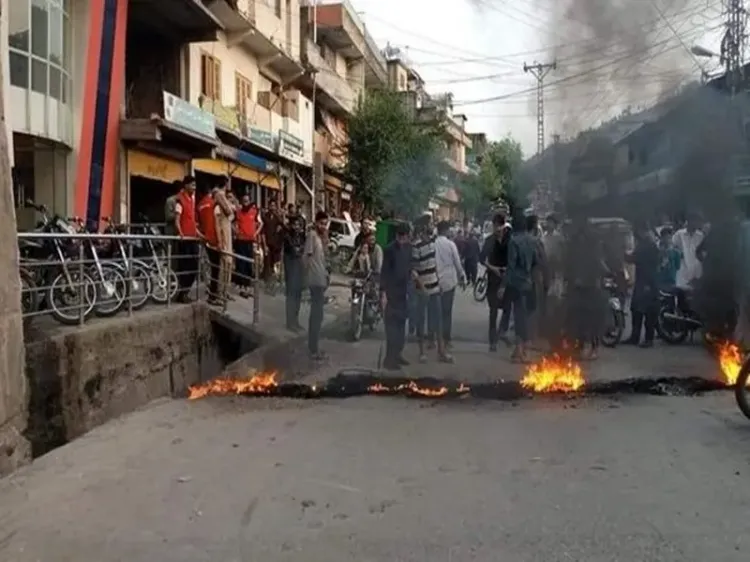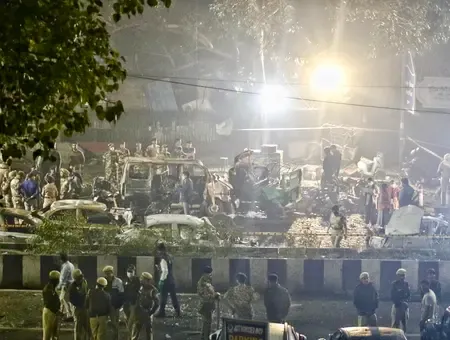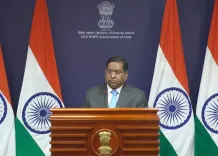Is the Kashmiri diaspora justified in their anger towards Pakistan's governance in PoK?

Synopsis
Key Takeaways
- Kashmiri diaspora expresses outrage over governance in PoK.
- Calls for a government-in-exile are gaining traction.
- Protests highlight the plight of Kashmiris facing repression.
- Activists accuse Pakistani leaders of corrupt practices.
- Desire for independence is growing among Kashmiris.
London, Oct 26 (NationPress) The Kashmiri diaspora has voiced significant discontent towards the Pakistani government regarding its ineffective and authoritarian rule in Pakistan-occupied Kashmir (PoK), describing Pakistan as a "sinking Titanic" that no individual wishes to join.
Kashmiris have characterized their relationship with Pakistan as strained, asserting that their cultural and ethnic identities are at odds with Islamabad's Islamic ideology. This discord has led some to contemplate establishing a government-in-exile to represent the interests of Kashmiris in PoK, according to a recent report.
Recently, British Kashmiris organized a hunger strike outside the Pakistan High Commission in London to draw attention to the plight of Kashmiris, particularly after their demands for basic rights were met with violent repression from Pakistani security forces in PoK, as reported by Sakariya Kareem in the UK-based publication Asian Lite.
Journalist Abdul Rehman Khan, based in London, highlighted how the Pakistani diaspora from PoK has engaged in protests, obstructing Pakistani diplomats' vehicles and chanting slogans in the UK, fueled by frustration over internet censorship and brutal crackdowns. In a Facebook post, Khan expressed, "Kashmiris! You are not alone; this atrocity must be addressed. A significant number of Kashmiris joined the Public Action Committee in Sheffield, UK, resulting in a crowded venue and a large gathering outside it."
Jamil Maqsood, the President of the Foreign Affairs Committee of the United Kashmir People’s National Party (UKPNP), remarked that Kashmiris in PoK are discontented with their living conditions due to a lack of opportunities in health, education, development, and employment. He stated, "Corruption, favoritism, and nepotism are rampant, and the imposed conditions have ignited resentment among the local population. Pakistan is a sinking Titanic, and we refuse to board it," as quoted in the Asian Lite report.
Dr. Yasin Rehman, a political activist from London, accused Pakistani leaders of exploiting PoK's resources for the past 80 years, prioritizing personal interests over the welfare of the local populace. Meanwhile, human rights advocate Reiss Haidar asserted that the residents of PoK desire to liberate themselves from Pakistan due to the ongoing suffering inflicted by the Pakistani government and army.
The Asian Lite report mentioned Maqsood's assertion that Pakistan is attempting to undermine the identity of Kashmiris through territorial manipulations and inciting violence. "Pakistan is a rogue state with a history of oppression. Its citizens are being coerced into proxy militancy. We will not be scapegoats for Pakistan's militant agenda," he stated.
In light of the escalating atrocities in PoK, Scotland-based Kashmiri activist Amjad Ayub Mirza has proposed forming a government-in-exile. He noted, "Numerous women have pledged their support for this government. Many youths working in the Middle East and Europe, along with various diaspora political parties, have reached out to us."










